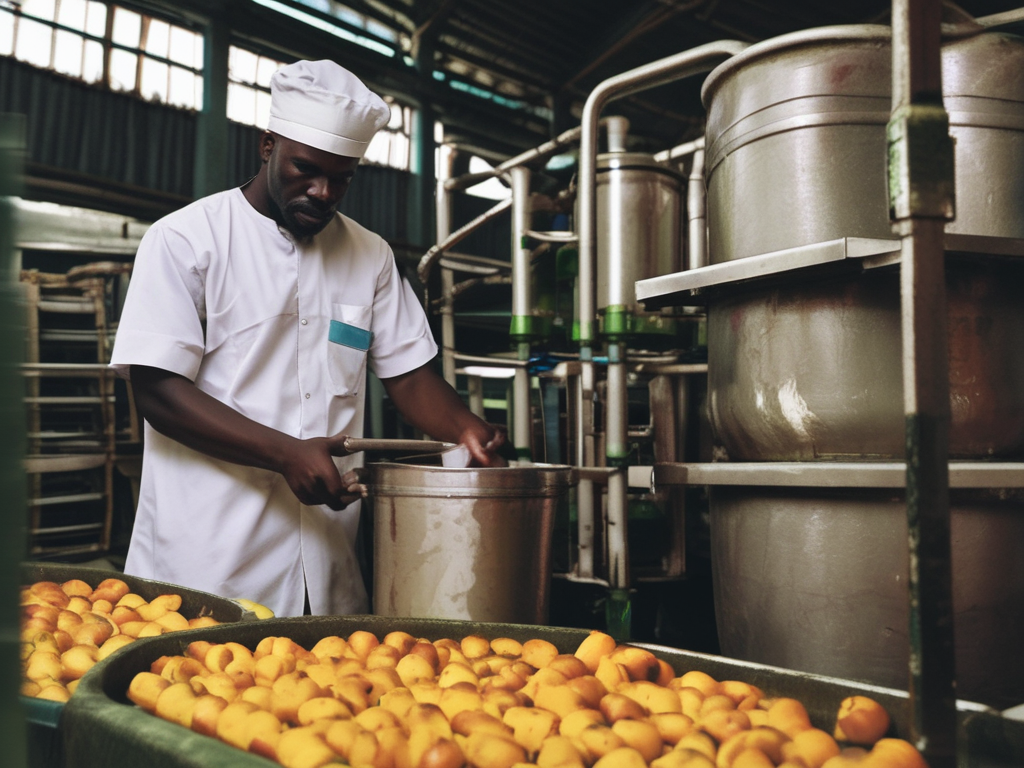Agro-processing businesses have immense potential in Africa, especially with the continent’s rich agricultural resources. Here are six top agro-processing business ideas that can transform agricultural produce into high-value products, driving economic growth and providing lucrative opportunities for entrepreneurs.
1. Fruit Juice Production
Fruit juice production is a thriving business with a growing demand for natural and healthy beverages. Africa’s diverse fruit varieties, including mangoes, pineapples, and oranges, provide a rich resource base for this venture. Setting up a fruit juice processing plant can turn fresh fruits into delicious and nutritious juices.
Steps to Start:
- Source Fresh Fruits: Partner with local farmers to ensure a steady supply of quality fruits.
- Acquire Processing Equipment: Invest in machinery for washing, pulping, pasteurizing, and packaging juices.
- Quality Control: Implement strict quality control measures to ensure product safety and consistency.
- Marketing and Distribution: Develop a robust marketing strategy and establish distribution channels to reach your target market.
Example: In Nigeria, Chivita is a leading brand that started small and has grown significantly. They process various fruits to produce a range of juices that are popular across the country.
2. Flour Milling
Flour milling is another lucrative agro-processing business, especially with the increasing demand for flour in the baking industry. Converting grains like wheat, maize, and sorghum into flour can be highly profitable. Flour is a staple in many African households, making this a sustainable business idea.
Steps to Start:
- Select the Grain: Choose grains that are locally available and in high demand.
- Set Up Milling Facilities: Invest in milling machinery and storage facilities.
- Quality Assurance: Implement testing procedures to ensure the flour meets industry standards.
- Distribution: Partner with local bakeries and retail outlets for distribution.
Example: In Kenya, Unga Group Limited has been a pioneer in flour milling, producing high-quality flour products that cater to both local and international markets.
3. Dairy Processing
The dairy industry offers vast opportunities, from milk pasteurization to the production of yogurt, cheese, and butter. Dairy processing not only adds value to raw milk but also extends its shelf life, reducing post-harvest losses and increasing profitability for farmers.
Steps to Start:
- Collect Raw Milk: Establish a network with dairy farmers for a steady supply of fresh milk.
- Processing Facility: Invest in equipment for pasteurization, fermentation, and packaging.
- Product Diversification: Offer a range of dairy products to cater to different market segments.
- Compliance: Adhere to health and safety regulations to ensure product quality.
Example: Fresh Dairy in Uganda has made significant strides in dairy processing, offering a range of products that have become household staples.
4. Vegetable Oil Production
Vegetable oil production involves extracting oil from seeds like groundnuts, soybeans, and palm kernels. This business is essential due to the high demand for cooking oil in both domestic and industrial kitchens. The by-products of oil extraction can also be used as animal feed, creating a secondary revenue stream.
Steps to Start:
- Select Oil Seeds: Choose oil seeds that are readily available and high-yielding.
- Extraction Process: Invest in oil extraction machinery and refining equipment.
- Quality Control: Implement processes to ensure the oil meets nutritional and safety standards.
- Market Research: Identify and target markets with high demand for cooking oil.
Example: Okomu Oil Palm Company in Nigeria is a prime example of successful vegetable oil production, contributing significantly to the local economy.
5. Fish Processing
Fish processing involves the preservation and packaging of fish products. This business can range from small-scale smoking and drying to large-scale freezing and canning. With Africa’s vast water bodies and rich fish resources, fish processing can be a profitable venture.
Steps to Start:
- Source Fish: Partner with local fishermen to secure a steady supply of fish.
- Processing Techniques: Utilize methods such as smoking, drying, freezing, and canning.
- Packaging: Invest in quality packaging to maintain product freshness and appeal.
- Market and Export: Develop local and international markets for processed fish products.
Example: In Ghana, Atlantic Shrimpers Ltd. processes and exports high-quality shrimp and fish products, catering to both local and international markets.
6. Honey Processing
Honey processing is a sweet and profitable business idea. By collecting, processing, and packaging honey, entrepreneurs can tap into the growing demand for natural sweeteners. Honey has various uses, from culinary to medicinal, making it a versatile product.
Steps to Start:
- Set Up Apiaries: Work with local beekeepers to source raw honey.
- Processing Equipment: Invest in equipment for filtering, heating, and packaging honey.
- Quality Assurance: Ensure the honey meets purity and quality standards.
- Branding and Marketing: Create a strong brand and marketing strategy to attract health-conscious consumers.
Example: African Bee Products in Tanzania has successfully tapped into this market, producing and exporting premium honey products.
Conclusion
Agro-processing businesses are a vital part of Africa’s economic growth. By adding value to agricultural produce, these ventures create employment, reduce post-harvest losses, and increase farmers’ incomes. Entrepreneurs in Nigeria and across Africa can leverage these top six agro-processing business ideas to build profitable enterprises and contribute to sustainable development. Investing in agro-processing is not just a business opportunity; it’s a step towards transforming Africa’s agricultural landscape.
Incorporating agro-processing into your business strategy can significantly enhance profitability and sustainability. By focusing on these high-potential areas, you can create a successful agro-processing venture that meets the growing demand for value-added agricultural products.


